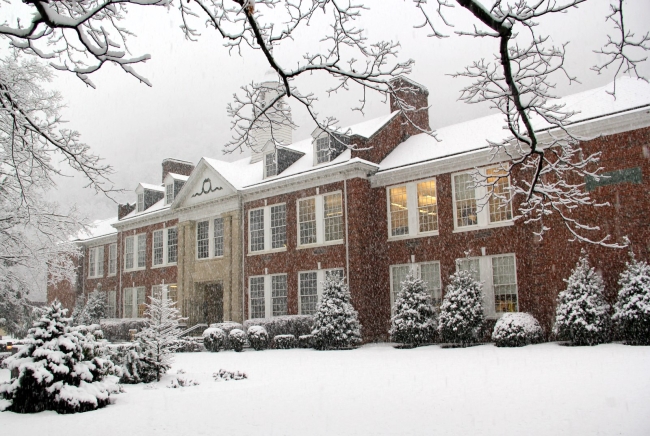You have /5 articles left.
Sign up for a free account or log in.

The Appalachian School of Law in Grundy, Va.
Appalachian School of Law
Appalachian School of Law, in the coalfields town of Grundy, Va., is struggling as much as any law school amid a plunge in applicants.
Last year, the stand-alone law school had an entering class of 48 students, down from 146 students in 2011. There has also been an exodus of professors and, as of now, there are at most eight professors on staff -- some say fewer -- to teach next fall.
Alumni and others close to the school now worry about its future and accuse a powerful board member of obstructing efforts to save it. These advocates believe the only way to save their school is to move it out of Grundy, a town of just over 1,000 residents. The exit of the law school might really hurt the town.
In the meantime, there is some worry about the quality of the school, which accepts students with some of the lowest LSAT scores in the country.
The head of an alumni group -- who is also a member of the college’s Board of Trustees -- wrote a scathing letter to the rest of the school’s trustees, alleging 47 percent of first-year students were failing at least one class. The letter also claimed the school was so desperate in its hunt for students that it posted an ad on Facebook that said it did not have a minimum LSAT score for admissions.
The alumni trustee, Tara Bartosiewicz-Blom, declined in a Facebook exchange to comment on the letter, which she also declined to confirm she wrote.
The LSAT is considered a key indicator of a student’s first-year performance. The American Bar Association, which accredits law schools, forbids schools from admitting students who school officials know cannot succeed.
A spokeswoman did not confirm that the ad ran and said the school does not accept students it believes are unqualified. (NOTE: This sentence has been updated to correct an error.)
All of this is perhaps just a symptom of a larger problem for Appalachian: its location. The school was founded to provide a legal education for students in the rural region but, as the number of students interested in law school has declined, it now seems to be struggling to enroll a critical mass of students or to retain professors.
According to sources, only six or seven professors remain at the school. The school spokeswoman, Donna Weaver, put the number at eight, although one is going to be away all of next year and may not teach. She said the school has a handful of professors is it recruiting.
The letter purportedly written by Bartosiewicz-Blom appeared to worry that there might not be enough academics left at the school to decide whether those applicants deserve a teaching job.
“Are there plans for retention of new faculty?” it asked. “Who will screen and approve faculty credentials?”
To some alums, what is happening has a solution: Appalachian should affiliate or merge with a college that wants a law school -- and if that means moving the school out of Grundy, so be it.
Amber Floyd Lee, a 2009 graduate, said unless the school moves from Grundy, “it will stay there and run into the ground and lose its accreditation.”
But there seems to be an obstacle to any move. Proponents of the move point to Mickey McGlothlin, the son of a wealthy coal operator and wearer of several hats, among them trustee. They said he and others on the board are thwarting their efforts to relocate the school.
Critics of the board say the members who oppose the move are not looking out for the law school’s best interests.
“It’s unconscionable,” Lee said, “and I believe they have breached the fiduciary duty to the law school, to the students and to the public.”
McGlothlin is also president of Appalachian College of Pharmacy in the nearby town of Oakwood. He’s also a former lawyer for Buchanan County, the county in southwestern Virginia that includes both Grundy and Oakwood. McGlothlin did not return calls and a text message last week and a college spokeswoman was not able to arrange an interview. The chairman of the law school’s board, a retired judge, also did not return a call seeking comment.
Part of what may be holding up a move by Appalachian is a compact the school signed with Buchanan County’s industrial development agency that said the school cannot be moved without approval of the county.
In a recent interview with a local TV station, McGlothlin said the compact was part of why the law school has to remain in Grundy.
McGlothlin was county attorney when the compact was drafted. Now he is a board member having to deal with the compact. So there have been questions -- directed at him -- about conflicts of interest that board members may have. There are also questions about whether the compact can be enforced.
There are, additionally, suggestions that McGlothlin is so intent on protecting Grundy by trying to keep the law school there that he may be harming the law school.
“The board members have a vested interest in their community; however, they also have a duty to the position they hold,” the recent alumni letter to trustees said. “It is with impartiality that the board should make decisions that are not conflicting with any other concerns or interests.”
Weaver, the spokeswoman, said some people will make the best choices for the school.
“I assure you we will,” she said in an email. “There is a body of people devoted to the school's viability, whatever course we take, all stakeholders considered.”
So far, reluctance to move the school may have contributed to impasses with four-year colleges interested in acquiring Appalachian.
At least two colleges have talked about taking over the Appalachian School of Law. One of them is nearby Emory & Henry College, a 960-student private college that is a 45-minute drive from Grundy. The other is East Tennessee State University, which is about two hours away and across a state line.
Emory & Henry, which doesn’t have a law school, confirmed it was in talks with Appalachian, which now seem stalled. Part of the holdup seems to be the law school’s location in Grundy.
Emory & Henry spokesman Dirk Moore said both the college and the law school had hired consultants who said relocating the law school might be a better option than trying to keep it in Grundy. He said officials at his college worried about trying to manage two disparate campuses. A decision by Emory & Henry has been delayed until at least the fall.
(For what it’s worth, the McGlothlin Foundation, controlled by Mickey’s brother James, is helping fund a $20 million arts center on the Emory & Henry campus.)
A senior East Tennessee official has approached people close to Appalachian about moving the school from Grundy to the university’s home in Johnson City, Tenn. Like Emory & Henry, East Tennessee does not have a law school. For each four-year college, the advantage of taking over Appalachian is getting quick access to an accredited law school rather than having to start one of their own.
An East Tennessee spokesman, in an interview, wanted to make clear that the university’s president, Brian Noland, has not been in formal talks with Appalachian. Nonetheless, the university’s head attorney, Ed Kelly, approached people close to Appalachian, according to Lee and another source.
Kelly used to teach at Appalachian, so he knows the school well. His offer tried to look out for a post-law school Grundy. For instance, he suggested East Tennessee put a rural family clinic in the law school building to help people in and around Grundy receive good medical care, and he said the university could offer scholarships to Buchanan County students. Kelly referred some questions to a university spokesman and didn’t confirm anything about his talks.
In the meantime, there is also concern about the students who remain at Appalachian, particularly in light of their incoming LSAT scores.
There is also at least one practice that makes it hard for students to leave Appalachian once they arrive: the school does not give students letter grades. The school spokeswoman said this was to “alleviate peer competition.” At other schools, students have complained such grading systems make it harder for them to transfer.
Sandy McGlothlin, the associate dean for academic affairs (who is married to Mickey McGlothlin), sent a Jan. 21 email telling faculty who teach first-year courses not to give students letter grades.
“I continue to receive requests from law schools asking that I translate first-year grades into a standard letter grading system so that potential transfer students can transfer all credits for courses in which they received a C or better in their first year at A.S.L.,” she wrote. “In the event that you receive any such requests, please remember that we cannot assign letter grades to students in the first-year courses, nor can we rank them. To do so would be in violation of our academic standards.”
Weaver, the school spokeswoman, said the grading system complies with A.B.A. rules.




